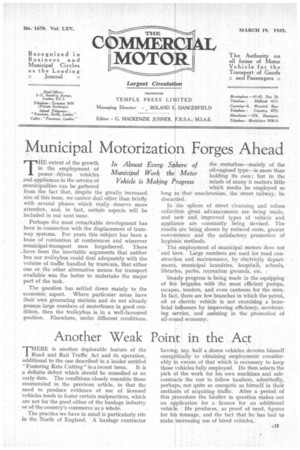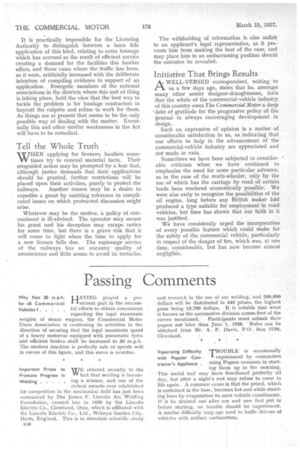Another Weak Point in the Act
Page 67

Page 68

If you've noticed an error in this article please click here to report it so we can fix it.
THERE is another deplorable feature of the I Road and Rail Traffic Act and its operation, additional to the one described in a leader entitled "Fostering Rate Cutting" in a recent issue. It is a definite defect which should be remedied at an early date. The conditions closely resemble those enumerated in the previous article, in that the need to produce evidence of use of licensed vehicles tends to foster certain malpractices, which are not for the good either of the haulage industry or of the country's commerce as a whole.
The practice we have in mind is particularly rife in the North of England. A haulage contractor having, say, half a dozen vehicles devotes himself energetically to obtaining employment considerably in excess of that which is necessary to keep those vehicles fully employed. He then selects the pick of the work for his own machines and subcontracts the rest to fellow hauliers, admittedly, perhaps, not quite so energetic as himself in their methods of acquiring traffic. After a period of this procedure the haulier in question makes out an application for a licence for an additional vehicle. He produces, as proof of need, figures for his tonnage, and the fact that he has had to make increasing use of hired vehicles. It is. practically impossible for the Licensing Authority to distinguish between a bona fide application of this kind, relating to extra tonnage whiCh has accrued as the result of efficient service creating a demand for the facilities this haulier offers, and those cases where the traffic has been, as it were, artificially increased with the deliberate intention of compiling evidence in support of an application. Energetic members cif the national associations in the districts where this sort of thing is taking place, hold the view that the best way to tackle the problem is for haulage contractors to boycott the culprits and refuse to work for them. As things are at present that seems to be the only possible way of dealing with the matter. Eventually this and other similar weaknesses in the Act will have to be remedied.
Tell the Whole Truth
WHEN applying for licences, hauliers sometimes try to conceal material facts. Their misguided action may be prompted by a fear that, although justice demands that their applications should be granted, further restrictions will be placed upon their activities, purely to protect the railways. Another reason may be a desire to expedite a grant by omitting reference to complicated issues on which protracted discussion might arise.
Whatever may be the motive, a policy of concealment is ill-advised. The operator may secure his grant and his deception may escape notice for some time, but there is a grave risk that it will come to light when the time to apply for a new licence falls due. The espionageservice of the railways has an uncanny quality of omniscience and little seems to avoid its tentacles. The withholding of information is also unfair to an applicant's legal representative, as it prevents him from making the best of the case, and may place him in an embarrassing position should the omission be revealed.
Initiative That Brings Results
AWELL-VERSED correspondent, writing to us a few days ago, states that he, amongst many other senior designer-draughtsmen, feels that the whole of the commercial-vehicle industry of this country owes The Commercial Motor a deep 'debt of gratitude for the progressive policy of the journal in always encouraging development in design.
Such an expression: of opinion is a matter of considerable satisfaction to us, as that our a at our efforts to help in the advancement of the commercial-vehicle industry are appreciated and not made in vain.
Sometimes we have been subjected to considerable criticism when we have continued to emphasize the need for some particular advance, as in the case of the multi-wheeler, only by the use of which has the carriage by road of certain loads been rendered economically possible. We were also early to recognize the possibilities of the • oil engine, long before any British maker had • produced a type suitable for employment in road • vehicles, but time has shown that our faith in it was justified.
We have consistently urged tire incorporation of every possible feature which could make for the safety of the commercial vehitle, particularly in respect of the danger of fire, which was, at one time, considerable, but has now become almost negligible.
























































































































































